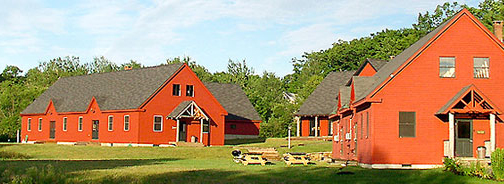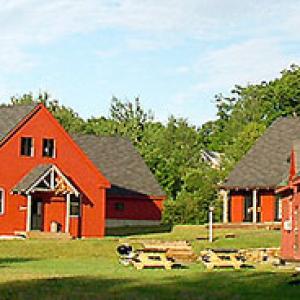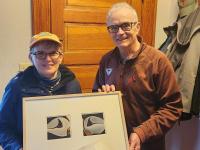Rockport approves school expansion but disputes tax-exempt status
ROCKPORT — The Rockport Planning Board Feb. 13 approved the addition of a woodturning studio on the Center for Furniture Craftsmanship campus, allowing another structure to be built on the 18-acre site near Tolman Pond on Route 90. At the same time, the Center is disputing the town assessor's opinion that the school should be paying property taxes, and has appealed his decision to the Rockport Board of Assessment Review.
That meeting is scheduled for April 9.
Town assessor Kerry Leichtman is also chairman of the Rockport Planning Board. He recused himself entirely from the Feb. 13 meeting when the town approved the Center for Furniture Craftsmanship expansion plans.
The new Woodturning Studio is to be 1,420 square feet in size.
The Center serves approximately 400 students through its programs and classes in furniture-making, and the related skills of carving, turning, marquetry and finishing.
The Center also operates the Messler Gallery, which exhibits the work of students and others four times a year.
Rockport Town Assessor Kerry Leichtman informed the Center last spring that even though it functions as a 501(c)3 nonprofit, it does not qualify for property tax exemptions. He asked the Center last year to pay $15,240 in real estate taxes, and another $2,135 in personal property taxes. The Center did pay those bills in September, and then asked the town for an abatement.
"I denied the abatement," said Leichtman. "Peter [Korn, executive director of the Center] came in. I denied it again."
"I hope it's an issue that will be amicably cleared up," said Korn Feb. 18. "Kerry could not have been more polite or friendly throughout the process."
Leichtman told the Center last March that he was reviewing town files of institutional exemption programs. On Feb. 18, he said he has reviewed three-quarters of the town's list of nonprofits. The Center is the only one that has not been been approved for tax exemption so far.
According to GuideStar, an online philanthropic research organization, there are 79 nonprofits with addresses in Rockport. They range in income from $4 to $5 million, such as Harbor Schools and the Cascade Foundation, to the modest, such as the Camden-Rockport Historical Society, with a 2011 income of $21,289. Not all of the 79 are physically based in Rockport and some are inactive, yet remain in existence.
According to Leichtman, the total land and property valuation of all Rockport's benevolent and charitable organizations amounted to $55.2 million in 2012. That translated to $674,891 that was not collected from the nonprofits because of their tax-exempt statuses.
The town's total 2012 valuation was $990 million.
"I don't give out exemptions lightly," Leichtman said.
The exchange of letters and documents between Leichtman and Korn deepened over the last 12 months, with extensive legal citations, supporting documentation and correspondence eventually filling a large ringbinder. Neither the assessor nor the Center's director have retreated from their positions. While Leichtman believes that within tax law there is little charitable or benevolent about the Center, Korn just as strongly believes that the institution he created is charitable under law, and has been so since 1998, when the Center incorporated.
He included in his documentation a 2007 letter from Rockport's then-assessor Judy Mathiau, who said the Center met qualifications as a benevolent and charitable educational institution.
It is rare for a town to deny a nonprofit tax-exempt status, although municipalities have noted over the years the absence of revenue to the taxrolls from most nonprofits.
Some towns, including Rockport, have asked nonprofits to help with the tax load by donating payment in lieu of taxes. In Rockport, several nonprofits have been doing that over the past decade, including the Center for Furniture Craftsmanship. In 2011, the Center donated $3,000 to the town, said Korn. He said the Center had donated payments to the town since 2000.
To qualify for tax-exempt nonprofit status, a corporation must prove its benevolent and charitable purposes. According to the Maine Office of Attorney General, such nonprofits are to serve the public or community at large. As of 2003, all nonprofits in Maine are either “public benefit” or “mutual benefit” corporations. Public benefit corporations, or “charitable corporations,” are recognized as tax-exempt under section 501(c)(3) of the Internal Revenue Code. Common examples of charitable corporations include volunteer fire departments, grant-making foundations and homeless shelters, according to Maine's Office of the Attorney General. Common examples of mutual benefit corporations are homeowners’ associations, snowmobile clubs and trade associations.
But educational organizations are also tax-exempt, from universities to independent preschools to public schools.
The Center maintains that it is tax-exempt because its educational missions falls within the definition of charitable. Under Maine law, Korn argued, the meaning of charitable derives from the statute of charitable uses "enacted in England in 1601 and properly describes activities which are beneficial to the public welfare." He argued that Maine law defines charitable purpose as including the advancement of education, as well as the advancement of religion, or promotion of health and governmental purpose.
But Leichtman told Korn that he was not convinced that the teaching of furniture craftsmanship represents education.
On March 30, 2012, Leichtman asked the Center to re-apply for the exemption it received in 2005. The Center subsequently applied, and Leichtman denied it on April 9. The Center then filed an abatement with the town. Leichtman denied the abatement request in November.
In May, Leichtman wrote to Korn: "It is a stretch to define school, in the sense the statutes intend, to the Center for Furniture Craftsmanship. The Center teaches a fine art craft: furniture as fine art. Schools and education, as referred to in statute and case law, refer to the type of instruction that is typical of an elementary school, middle school, high school, and vocational school. Woodworking, in the vocational sense, would focus more on practical tradesmanship than fine art craftsmanship."
He added: "I cannot stress strongly enough that this denial of a property tax exemption is not a judgment on the quality of the work you are doing or have done. It is a judgment about the Center's property tax status made from the perspective of property tax law statute and precedent."
He and Korn continued to debate the definition of education under the tax code over the spring and summer, and in a Nov. 16 letter, Leichtman suggested that Korn was regarding education in "the all-inclusive sense," that "kind of education that is common to us all, the typical curriculum we all need as a base from which to launch our lives."
He added: "The IRS definition reinforces my interpretation of case law by describing educational organization as one that teaches the core curriculum typical of public education that is common to us all. That our two positions can be supported by case law and reasonable argument, if nothing else proves that the term education is not simply defined. Does it mean a typical 3R's core curriculum, or the teaching of anything worthwhile, or something between the two extremes? All doubt and uncertainty must be weighed against exemption. Only organizations whose function clearly fits within statute should be permitted an exemption from their share of the public burden."
Korn asked Leichtman that month to reconsider his decision, but on Nov. 29, the assessor wrote: "On Nov. 16, 2012, I denied your application for abatement from your 2012 property taxes. In reaction, you brought me additional materials and asked that I reconsider that decision. I agreed to do so. I have, during the course of the past six months, spent a significant amount of time considering your application materials and appreciate having had your cooperation during this process."
Still, Leichtman said Maine case law precedent "does not say education is a benevolent and charitable endeavor, it says education may be a benevolent and charitable endeavor."
He said that the Center's purpose statement was vague and "illustrative of a business model for which preservation of the business is the priority."
According to the Center's 2011 IRS Form 990, the nonprofit reported $1.2 million in revenue, and $1.08 million in expenses.
Leichtman said to Korn in his Nov. 29 letter: "When I ask myself the litmus test question, 'Where's the charity?' I don't come up with very much, and of what there is it seems that the Center for Furniture Craftsmanship contributes very little. The Center receives tuition for the scholarship students from Au Pair, Powermatic and private gifts. So while the students get a break off tuition, the Center still gets paid. The only scholarships that require financial aid from the Center's resources are those funded out of its own endowment fund."
Leichtman told Korn he had 60 days to appeal his decision to Rockport's Board of Assessment Review.
Korn then assembled on Jan. 18 a substantial application for appeal, including a 25-page document refuting Leichtman's points. He said in his grounds for appeal that the assessor's denial of the Center's abatement is illegal under Maine law. He further said that Leichtman's interpretations run contrary to civil tradition.
Korn said the cost of tuition is "substantially undewritten by charitable public support directed towards annual operations, endowment, and capital expenses, such as land, buildings and equipment."
He said the list of donors is 700, who have invested more than $2 million.
He also said the Center's most recent audit valued the campus, minus accumulated depreciation, at $1.3 million, while the town assessed it at $1.4 million.
"If the school were a for-profit business that had to recover its capital investment through earned income, then (even applying today's low commercial rates to the depreciated value of the land, buildings and equipment) interest would add approximately $68,000 to the school's operating overhead."
He reported that the Center has received $4 million in gifts and pledges to its endowment, and said that 30 percent of the true cost of tuition is underwritten for every student by charitable contributions to the school.
The Center's attorney, Leonard Cole, of the Portland-based firm Preti Flaherty, wrote to Leichtman April 27 that there is "ample and compelling reason under law and precedent to continue the Center for Furniture Craftsmanship's exempt status."
The Rockport Board of Assessment Review meets next April 9, when it will consider the Center's abatement request. The board consists of Douglas Linder, Ray Freitag, Howard (Tony) Bates, Laurence A. Lehmann and Peter E. van der Kieft.
Editorial Director Lynda Clancy can be reached at lyndaclancy@penbaypilot.com; 706-6657.
Event Date
Address
25 Mill Street
Rockport, ME 04856
United States


























